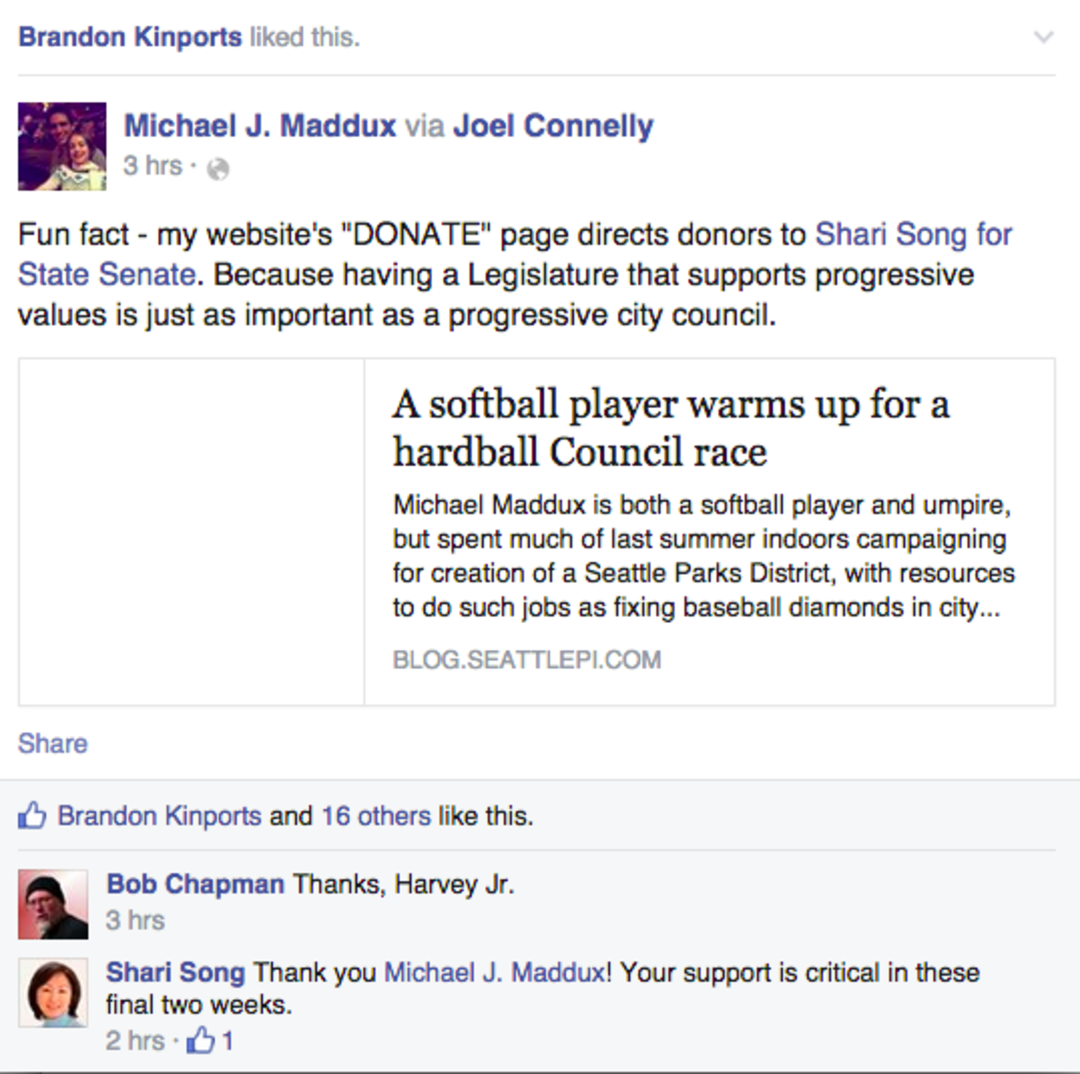Morning Fizz: Six Degrees of Political Separation

1. Okay, stick with the six political degrees of separation here: This year's heated state senate battle in the 30th Legislative District (Federal Way, Des Moines, Auburn) between Democrat Shari Song and former Democratic state rep-turned-Republican candidate Mark Miloscia has worked its way into the 2015 city council race.
Miloscia campaign staffer and GOP operative Keith Schipper has filed a campaign finance complaint against Democratic activist-turned-city-council hopeful Michael Maddux. Maddux, chair of the King County Democrats Endorsement Committee, announced his candidacy for Seattle City Council last Friday.
Schipper's complaint accuses Maddux of using his website to raise money for another campaign, Song's—a violation of campaign rules, the complaint contends.
From Schipper's complaint:
Michael J. Maddux announced today, Friday, October 17, 2014 his intention to run for the Seattle City Council. He launched a campaign website complete with a biography page, issues page, and a link to donate. However, if you click the donate link, it directs you the donation page of another campaign: Shari Song, candidate for State Senate in legislative district 30. This is prohibited under RCW 42.17A.430 section 8: "No candidate or authorized committee may transfer funds to any other candidate or other political committee."
Using his campaign website to raise funds for another candidate is explicitly using his own campaign funds for her campaign through the value of creating and adminstering the donation page on his website.
Schipper's complaint comes with the following evidence:

A Friday afternoon screen shot of Maddux's website (but is it an official campaign website?) with a link to donate to Song ...

A Friday morning screen shot of his FB page alerting people to the Song link on his own website...
As an outspoken Democratic activist, Maddux came out against then-Democrat Miloscia during Miloscia's failed 2012 run for state auditor. Miloscia is a labor lefty, but has Rick Santorum-style social views on choice and gay marriage. Maddux is gay.
Maddux tells Fizz (and take notice to the reference to his "personal website," his defense against cross-campaign pollination):
I independently chose to put a Donate to Shari Song link - that goes to her donate page - on my personal website because that race is important. She is up against a known opponent of civil rights and opponent for reproductive freedom. More important, Shari would be a voice and leader on transportation, education, and bringing jobs to our region. Shari isn't a "my way or no way" type of legislator, and is the right choice. I have filled out an in-kind donation form for good measure.
2. Speaking of (sort of) next year's City Council races: Here's some more on the poll we wrote about on Friday afternoon that showed Kshama Sawant (and Mayor Ed Murray, actually) with stratospheric favorable ratings (Murray at 70 percent favorable and Sawant—in her district—at 61 percent).
Licata does the best among the crew taking 25 percent to Clark's 19, Burgess' 13, and O'Brien's 13. "Undecided" wins, though, at 26 percent.
The poll, by EMC, also tested "re-elect" ratings and at-large contests (the new system has seven districts and two "at-large" positions.)
The five council incumbents they tested for re-election at the district level—Sawant, Sally Bagshaw, Jean Godden, Bruce Harrell, and Tom Rasmussen—all get "net-positive" re-election ratings, with Sawant doing the best at 54-32.

As for the "At-Large" scores in EMC's hypothetical contest between a batch of four incumbents—Burgess, Clark, Licata, and Mike O'Brien—Licata does the best among the crew, taking 25 percent to Clark's 19, Burgess' 13, and O'Brien's 13. "Undecided" wins, though, at 26 percent.
3. We often go on and on about the importance of arts & culture to politics: A line around the block at a music show, lecture, or reading is a political win for Seattle.
So, a big On-Other-Blogs-Today shoutout to City Arts magazine for an important feature article (history lesson) on Seattle's "first disco," Shelly's Leg, an openly gay Seattle club in the mid-'70s that CA explicitly connects to today's progressive political renaissance.
From Jonathan Zwickel's ambitious lead:
Seattle’s first disco nudged the city toward its left-leaning future.
In the last two years, Seattle has evolved so far so fast that the hyper-progressive trinity of marriage equality, legal weed and $15-an-hour minimum wage is already a just another bullet point on the city’s permanent record. History, it seems, is easy to make in this place. Preoccupied as we are with its current convolutions, we forget that history has often been made here and cultural amnesia can be as much an asset as an affliction. When your vision is forever aimed ahead, ridiculous personal whim might turn into legend behind your back.
Few cities sustain the delicate, critical balance of Utopian misfits and dependable cynics that have long populated Seattle. Both camps collide in the best Seattle stories, the stories that are simultaneously emblematic and idiosyncratic. Like the story of Shelly’s Leg, which veers from a freak parade-float accident to a crystallization of an era and then—like a half-hearted local band or a low-rise building in South Lake Union—disappears under the heavy bootheel of progress. This particular disappearance, however, involves a gasoline-fueled firestorm.
4. Hard to know what's going on here, but on Friday afternoon, Republican congressional candidate Pedro Celis' campaign tweeted that Celis, a former Microsoft exec who's running against U.S. Rep. Suzan DelBene (D-WA,1), was ranked 399,549 on a list of 400,000 "hottest men in technology."
Celis was ranked 399,549 on the list of 400,000 "hottest men in technology."
Earlier in the week, Celis and his campaign—addressing women's pay in tech—said even though women aren't "nerdy" like men, they should still be part of the tech community for being good at communication.
5. As the City Council gets ready to pass council member Mike O'Brien's "linkage fee" today—a charge on developers whenever they build downtown, around transit hubs, or in lowrise and multi-family zones—developer lobbyist Roger Valdez posted an alternative idea on his developer-funded website, pointing out an MIA piece of O'Brien's equation: If there's a link between new development and scarce affordable housing (the money goes into the city's affordable housing fund), why not tax all households?
Fizz likes to think of it as a "preservation tax"—a fee on single-family houses (which take up 65 percent of the city's developable land) that are also contributing to the housing crisis.
Valdez writes:
If we need 70,000 units in the next 20 years that would be 3,500 units per year. If we guessed that about a quarter of those needed to be built with a subsidy at an average cost of $250,000 per unit that would be 875 units for a total of $72,187,500 a year.
If this cost was divided evenly across Seattle’s roughly 350,000 households that would be about $206.25 per household per year, or about $17.18 per month.




